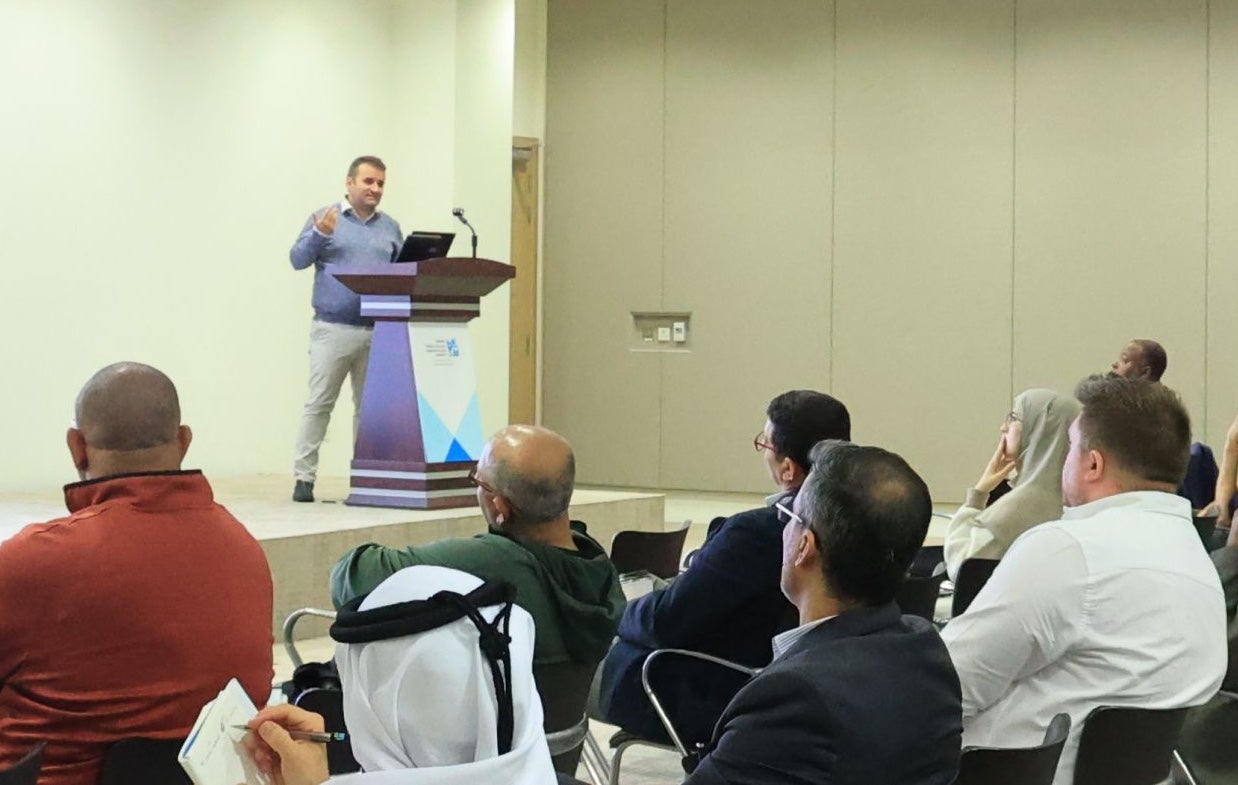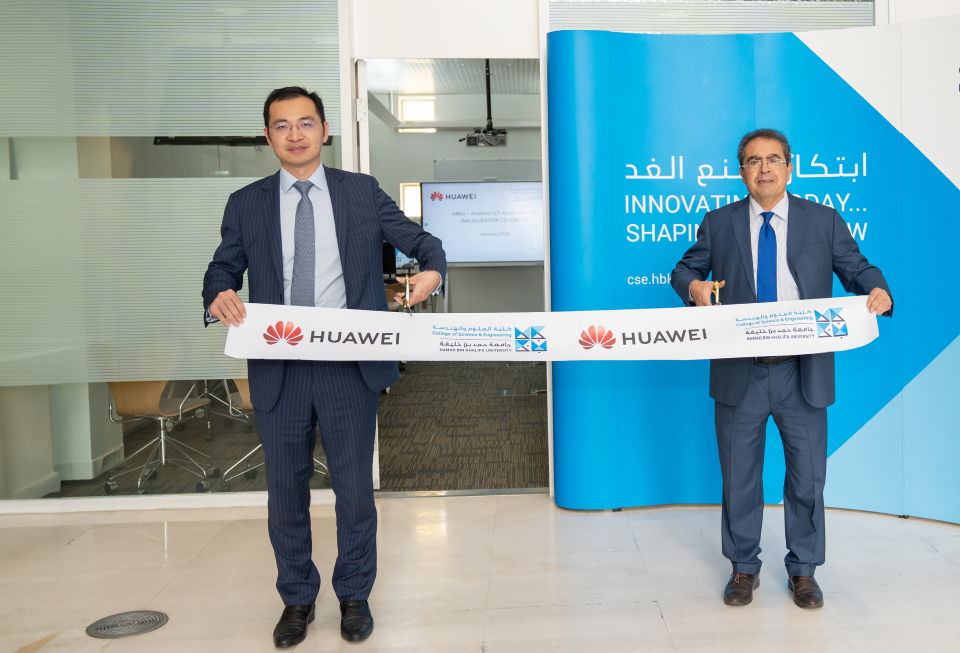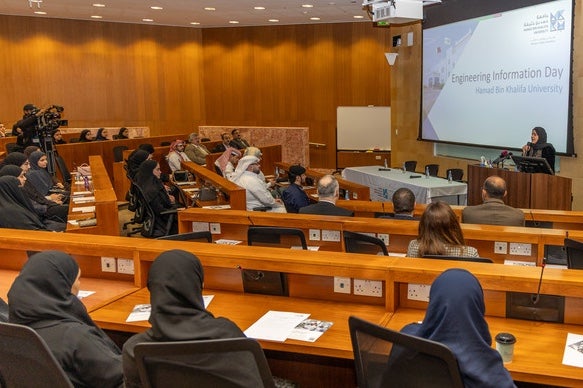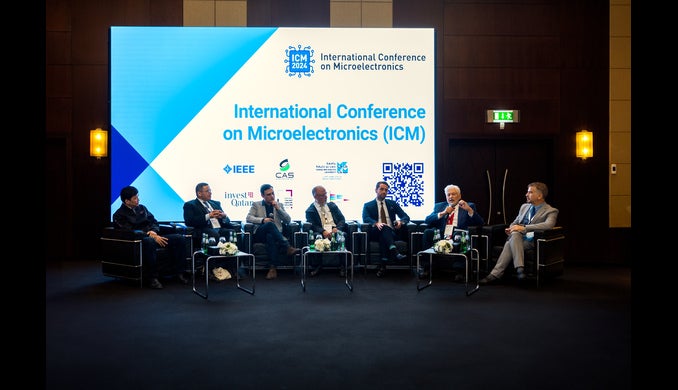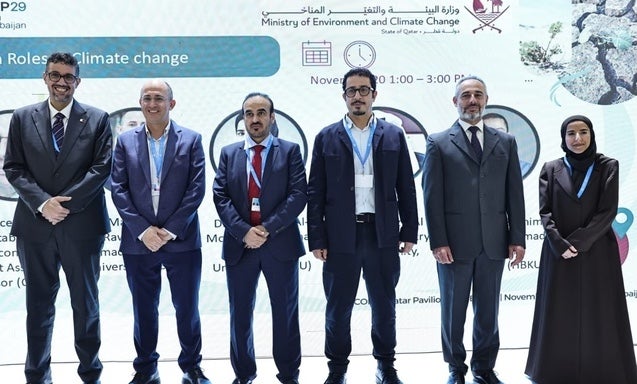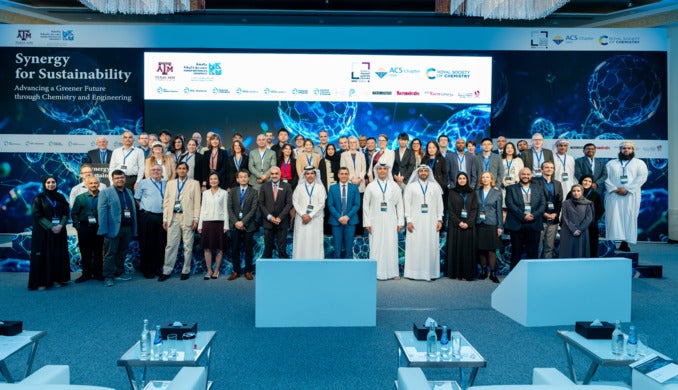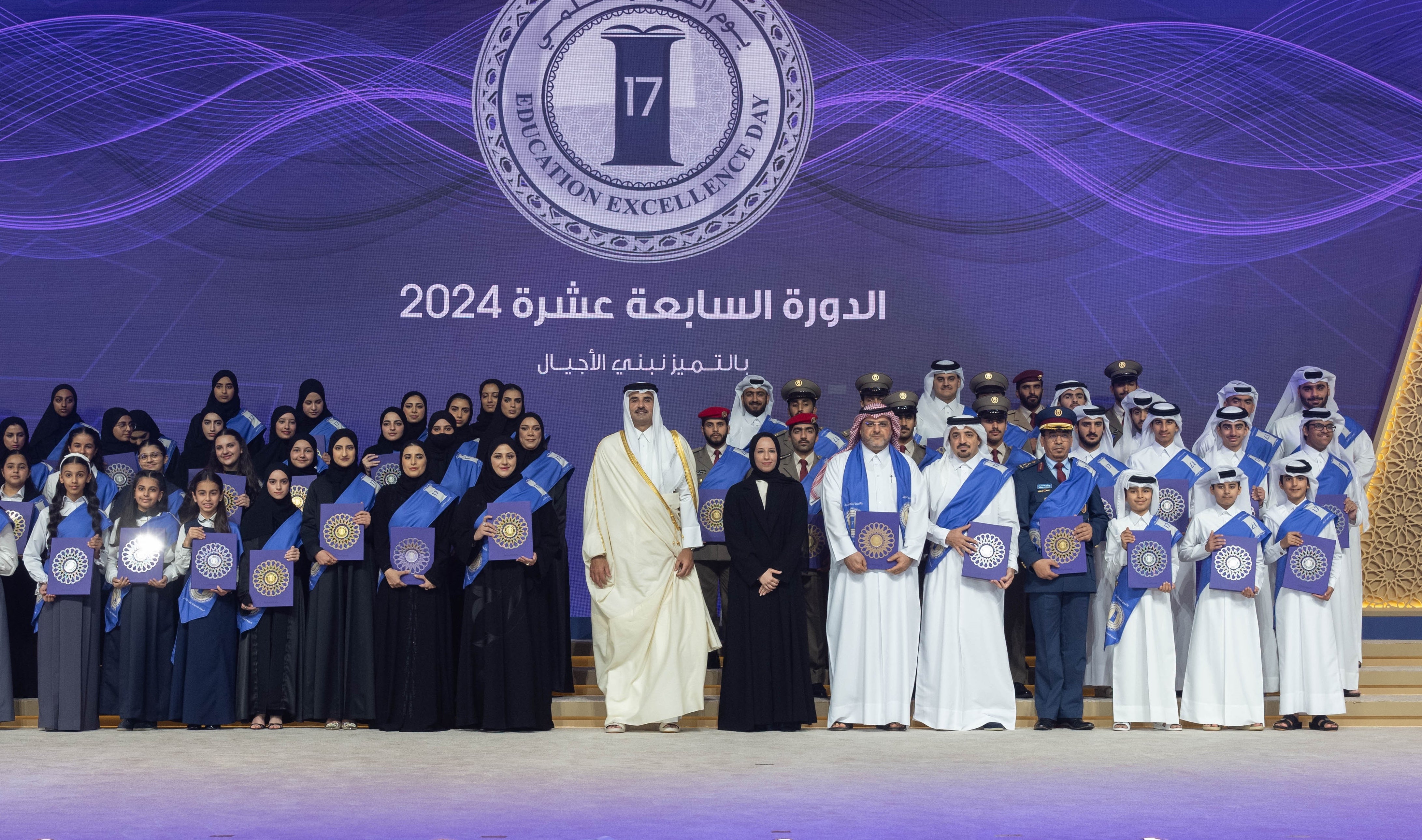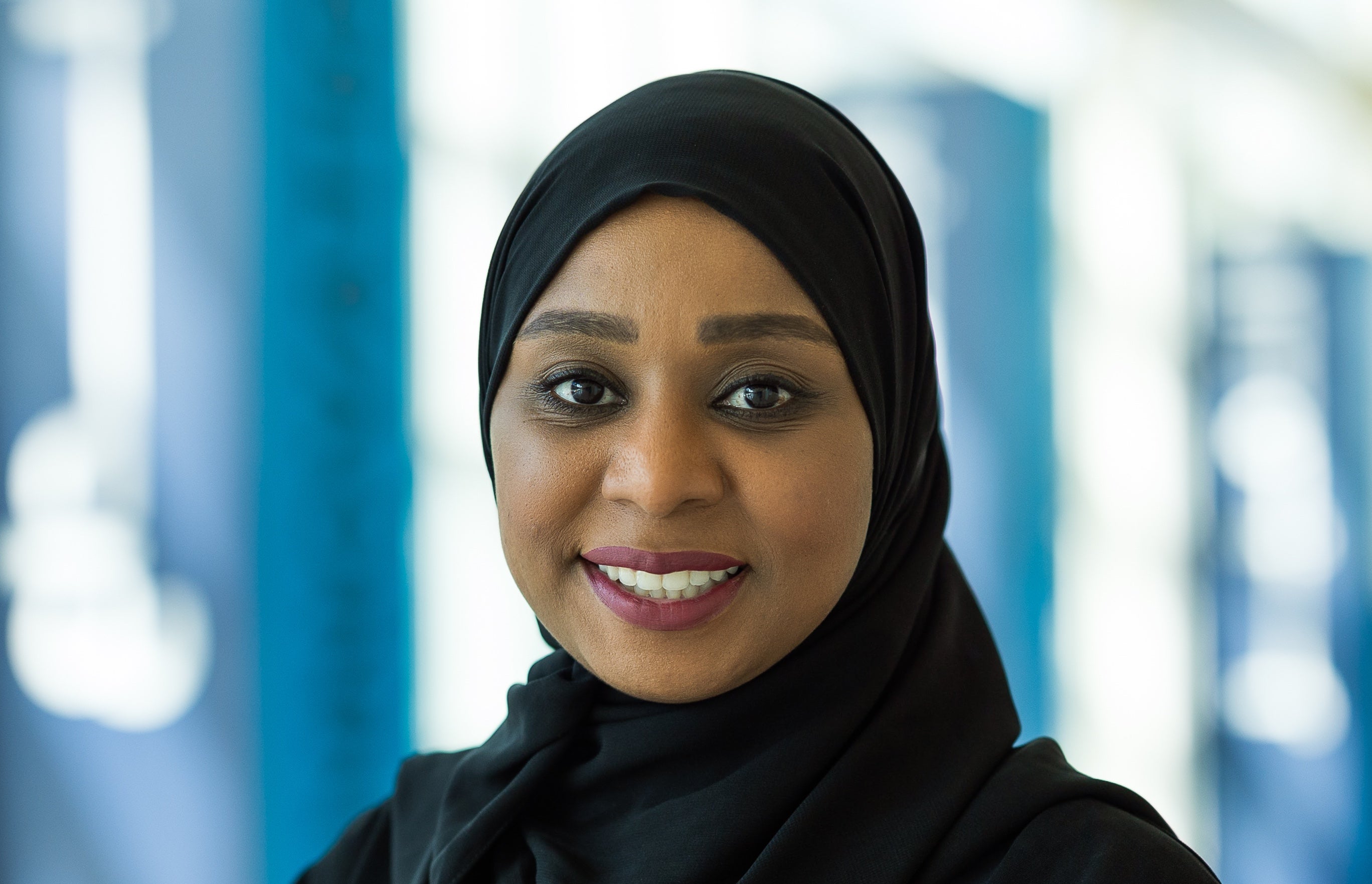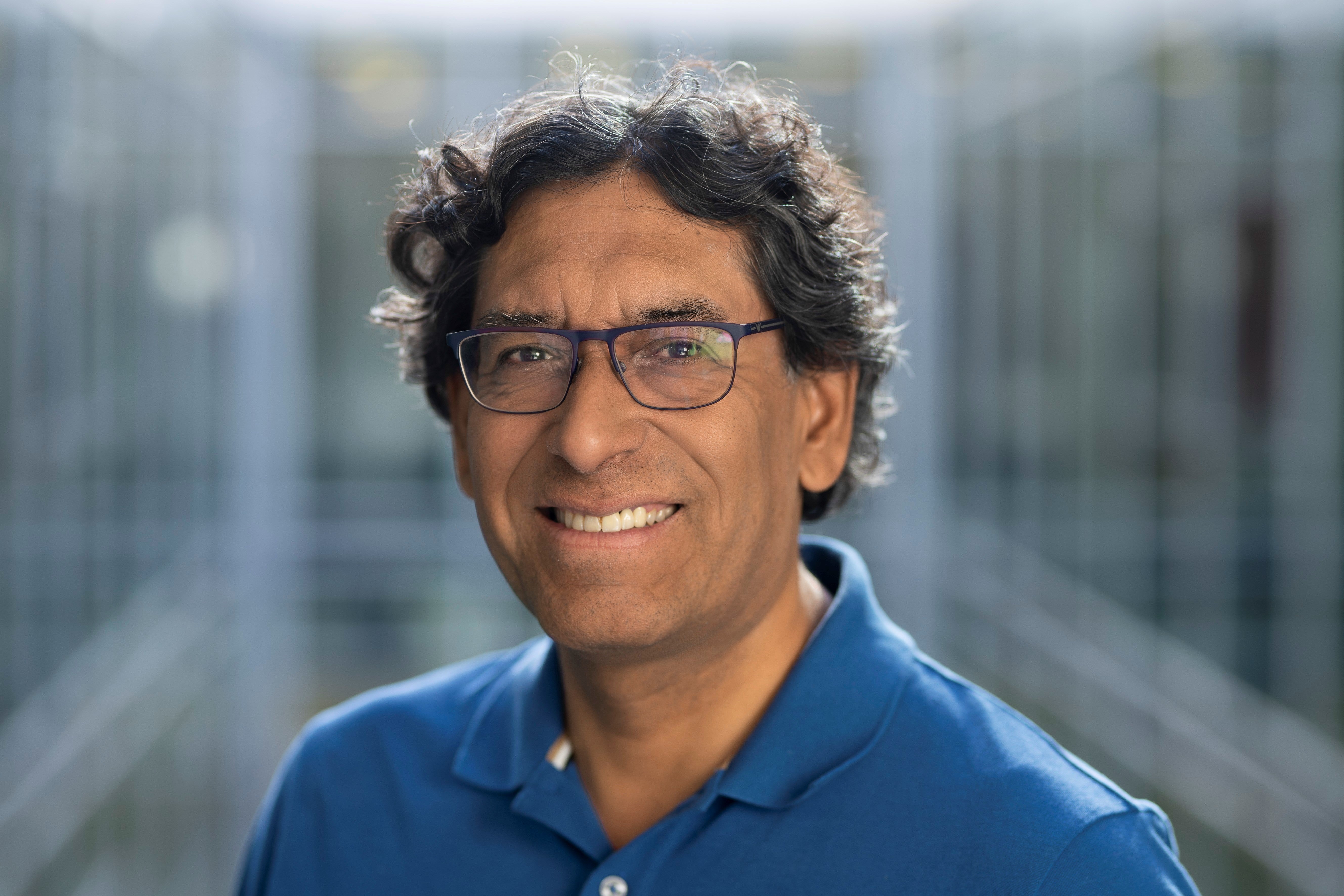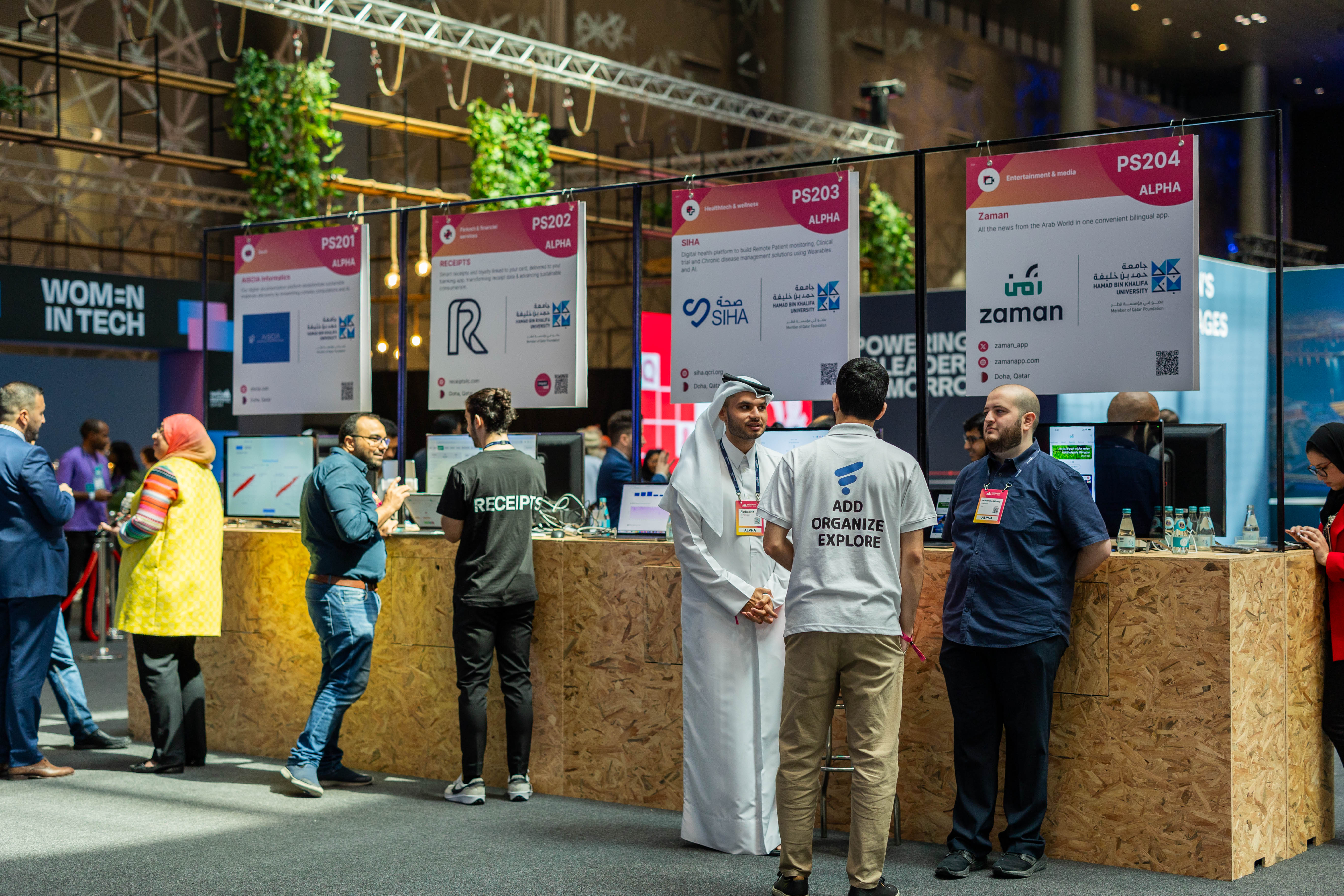
HBKU’s College of Science and Engineering Hosts 10th International Symposium on Networks, Computers and Communications
Event included lectures from experts at NASA, European Space Agency, and China’s State Key Laboratory of Space-Ground Integrated Information Technology

The College of Science and Engineering (CSE) at Hamad Bin Khalifa University (HBKU) held the 10th International Symposium on Networks, Computers and Communications (ISNCC’23) from October 23 to 26 at Education City.
The State of Qatar’s Ministry of Communications and Information Technology (MCIT) and QNRF Programs, part of Qatar Research, Development, and Innovation Council, sponsored ISNCC’23, which showcased the latest academic excellence and pioneering research in the fields of information systems, communication networks, and computing technologies.
Experts representing a wealth of renowned organizations, including NASA, European Space Agency (ESA), and China’s State Key Laboratory of Space-Ground Integrated Information Technology, attended ISNCC’23 alongside members of academia and industry from around the world. Throughout the three-day event, participants exchanged practical and theoretical knowledge across major topics, including 6G technology, next generation networking, edge intelligence, and green communication systems.
The Institute of Electrical and Electronics Engineers (IEEE) also worked with the conference organizers in HBKU to shape and inform proceedings.
Noting the success of ISNCC’23, Dr. Aiman Erbad, Associate Professor and Division Head, Information & Computing Technology Division, CSE, and ISNCC 2023 General Chair commented: “ISNCC’23 embodied how collaboration and vibrant discourse can spearhead innovation in networks, computers, and communications. We are grateful to our partners MCIT, QRDI Council, and IEEE for their support in organizing this landmark event.”
Ms. Eman Al-Kuwari, Director of Digital Innovation Department at MCIT, said, "Participation in the International Symposium on Networks, Computers, and Communications conference reaffirms our commitment to advancing technology and strengthening global partnerships, in line with our vision for a more interconnected world. We anticipate that our collaborative efforts will shape the future of global communications and technology. The Ministry of Communications and Information Technology is steadfast in its mission to explore new frontiers in the digital domain and remains dedicated to fostering international collaboration and pioneering solutions.”
Prolific Arab experts gave keynote addresses throughout the event, including Mérouane Debbah, Director, 6G Research Center, and Professor of Electrical Engineering and Computer Science, Khalifa University; Mohamed-Slim Alouini, King Abdullah University of Science and Technology; and Mohamed Abid, Mars 2020 Deputy Chief Engineer, Jet Propulsion Laboratory, NASA. Their talks highlighted large language models designed for wireless communications, the potential of extreme band communications, and the past, present, and future of NASA’s Mars missions.
Internationally based figures also gave speeches, including Fernández Piñas, Telespazio Belgium and ESA; Giancarlo Varacalli, Head of Telecommunications and Navigation Department, Italian Space Agency; and Shichao Jin, Director of the State Key Laboratory of Space-Ground Integrated Information Technology, Space Star Technology Co. Ltd., China. These presentations revolved around integrating satellites in advanced networks for multimedia applications, recent trends in space communications towards global connectivity, and space-ground converged intelligent networking technology.
ISNCC’23 saw academic and industry researchers give a multitude of online and in-person presentations on scientific papers, covering topics including artificial intelligence, the Metaverse, cybersecurity, the Internet of Things, Industry 4.0, and more. The symposium also included an industrial panel aimed at highlighting applied research and important developments in smart city technologies to foster innovation and actionable solutions, as well as various student-led activities and submissions.
“ISNCC’23 encapsulated the rapid progress and cutting-edge research conducted across the fields of networks, computers, and communications here in Qatar and the region,” added Mrs. Riham Daher, Director, Scientific Research, QNRF Programs, part of Qatar Research, Development, and Innovation Council. “By supporting this Symposium, we at QNRF Programs are helping to put the spotlight on Arab innovators and their technologies while also participating in global discourse.”
HBKU’s CSE is internationally recognized for its pursuit of high-impact research that addresses the societal and economic needs of Qatar and the world. Its programs involve collaboration with HBKU’s prestigious research institutes, utilizing the skills of expert scientists, and with external world-renowned academics and industrial partners strengthening the link between education and maximizing students’ employability.
Related News
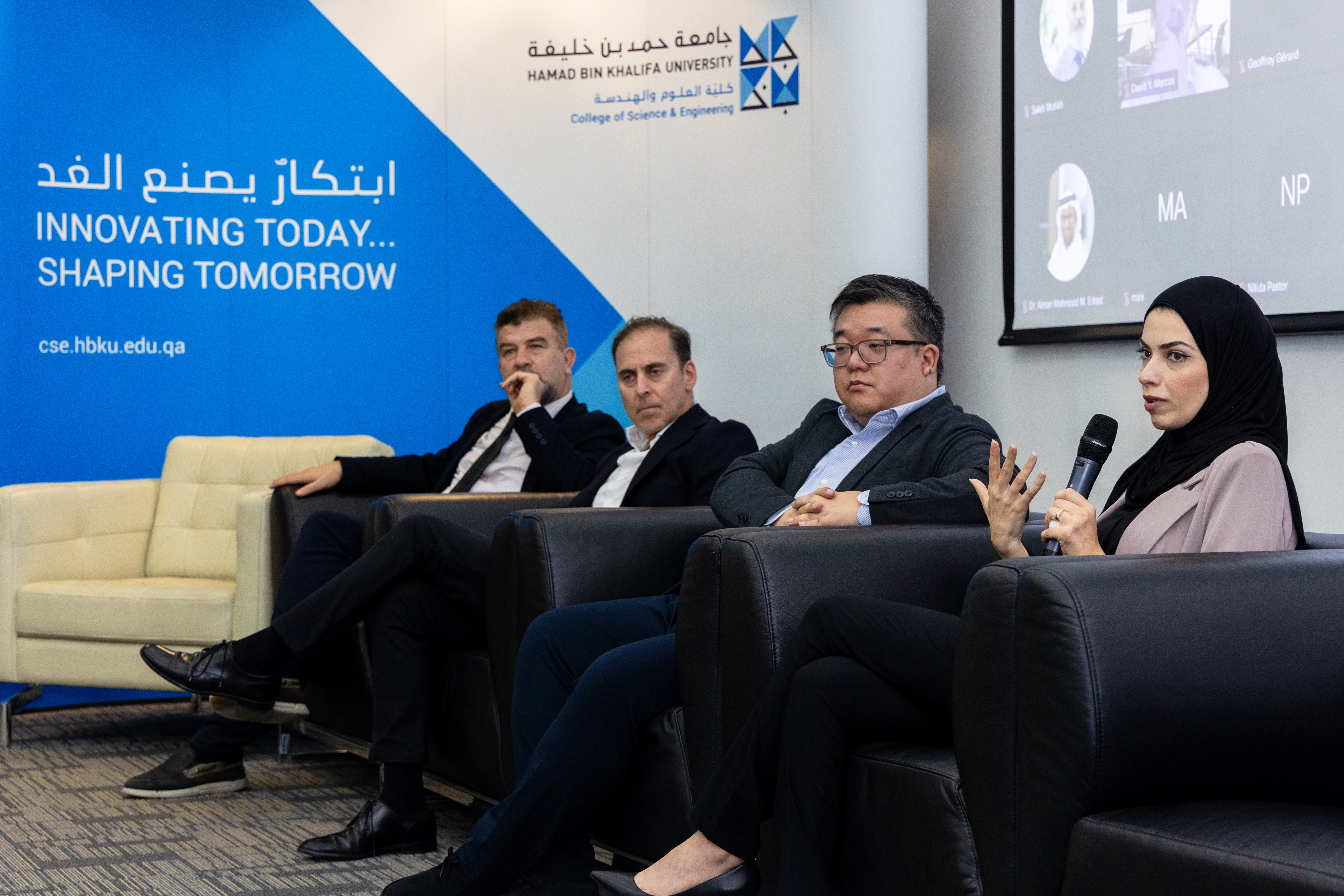
HBKU’s CSE and IE Impact Xcelerator Host Healthcare and Technology Collider Roundtable
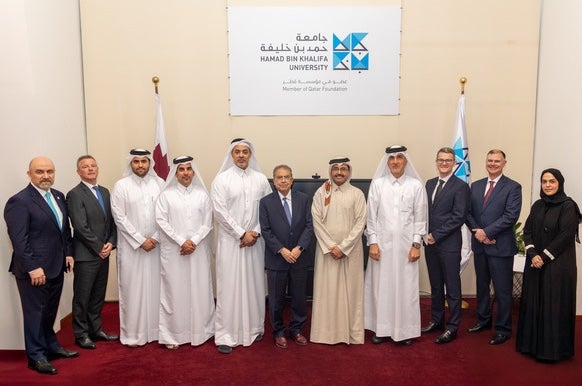
HBKU’s College of Science and Engineering Organizes First Industry and Government Advisory Board Meeting
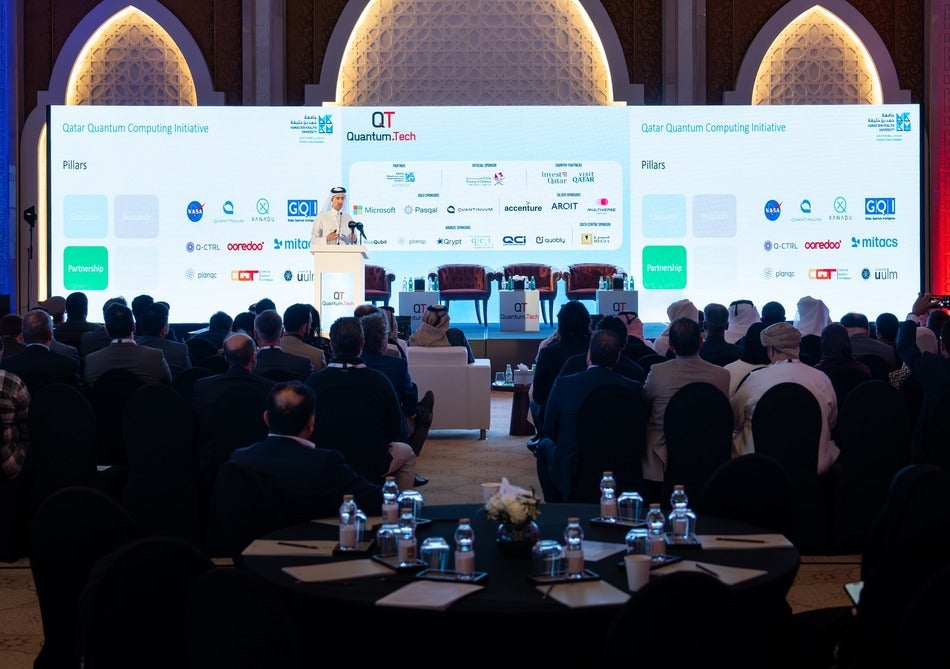
HBKU and Quantum.Tech Bring Major Quantum Event to the Middle East for the First Time
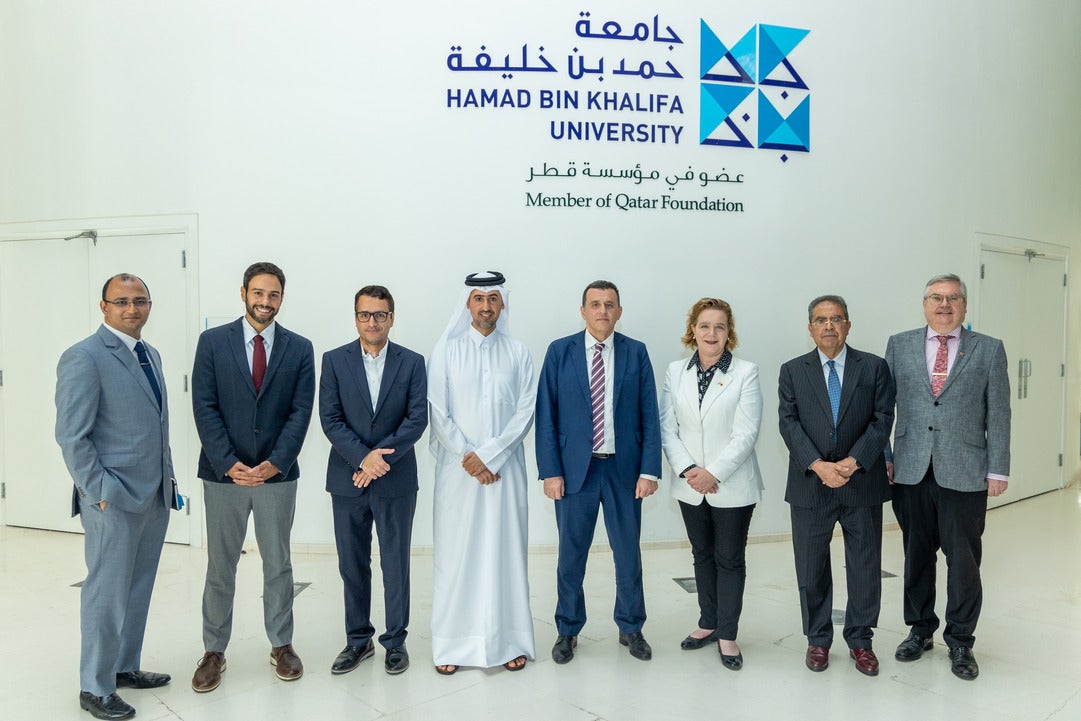
HBKU Signs Memorandum of Understanding with Canada’s Leading Innovation Organization
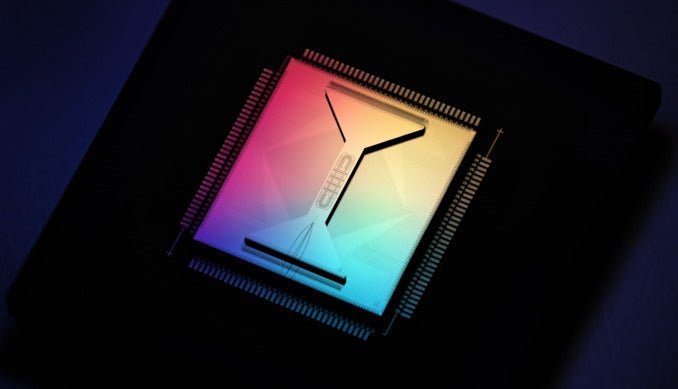
Hamad Bin Khalifa University and Quantinuum Partner to Advance Quantum Computing in Qatar
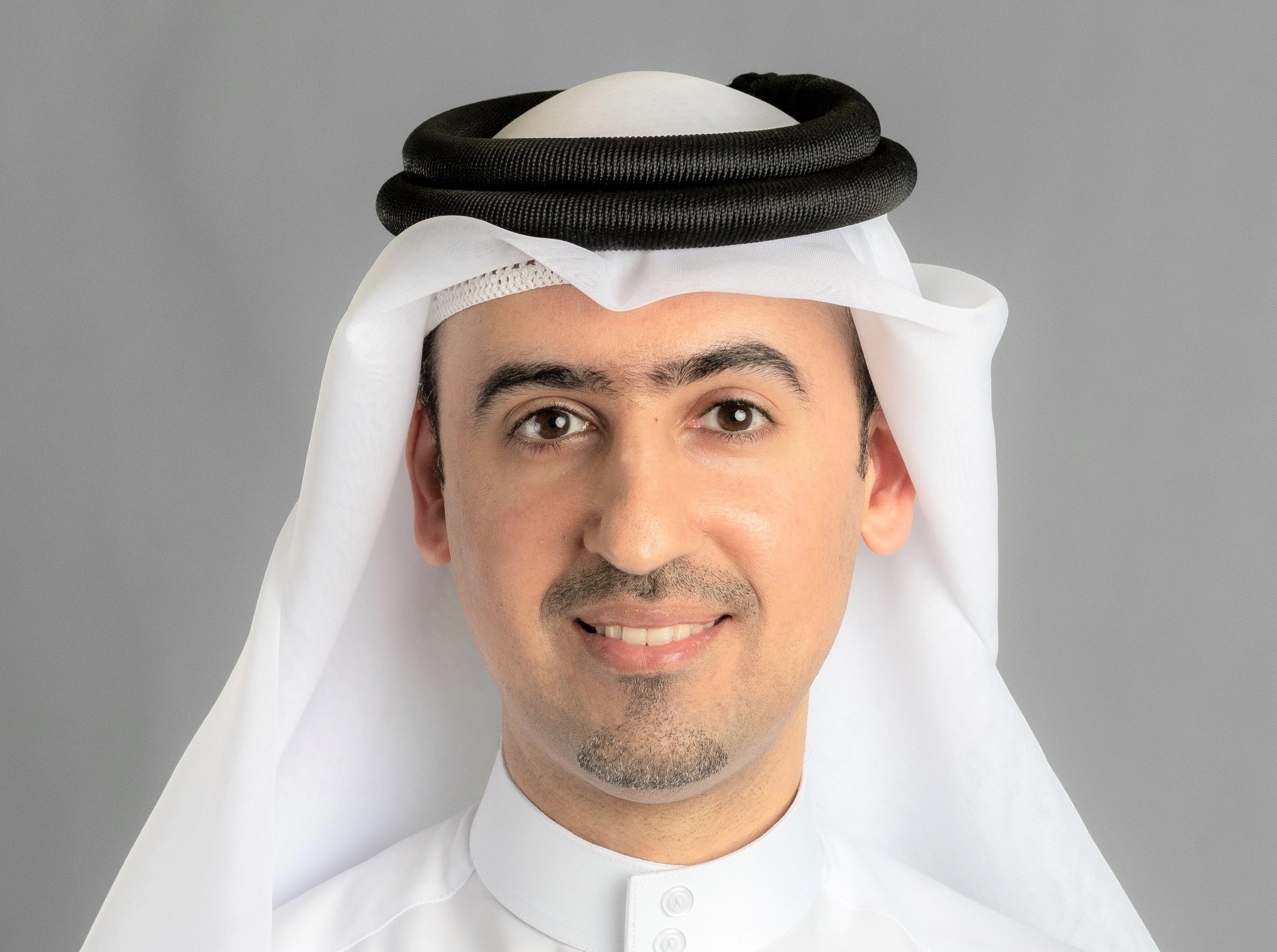
HBKU’s College of Science and Engineering Signs Memorandum of Understanding with NASA on Quantum Research and Education
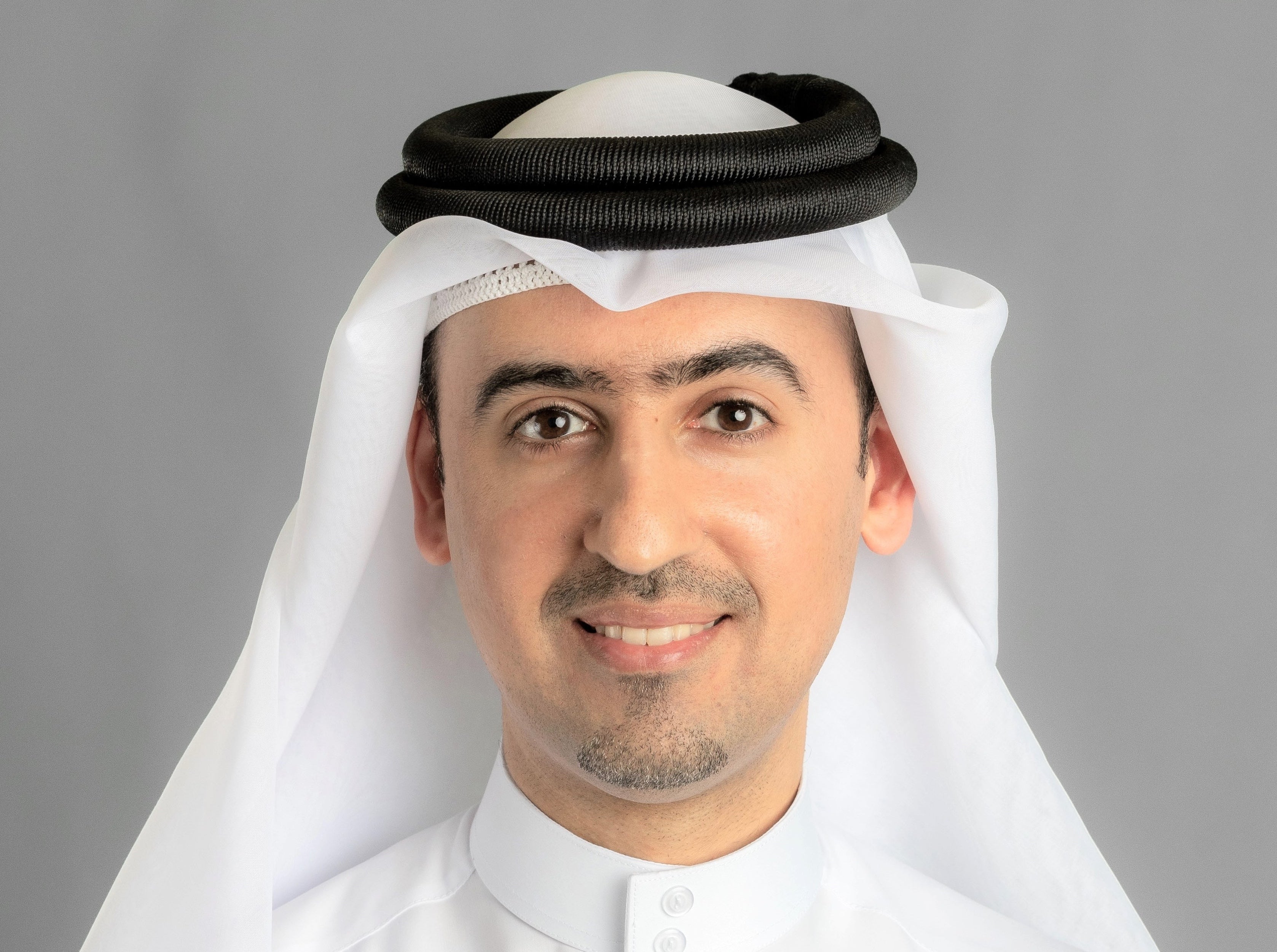
Q-CTRL and Hamad Bin Khalifa University’s College of Science and Engineering Partner to Equip the Next Generation Quantum Workforce in Qatar

QF’s Hamad Bin Khalifa University to Offer Undergraduate Engineering Programs in Education City

HBKU’s CSE and IE Impact Xcelerator Host Healthcare and Technology Collider Roundtable

HBKU’s College of Science and Engineering Organizes First Industry and Government Advisory Board Meeting

HBKU and Quantum.Tech Bring Major Quantum Event to the Middle East for the First Time

HBKU Signs Memorandum of Understanding with Canada’s Leading Innovation Organization

Hamad Bin Khalifa University and Quantinuum Partner to Advance Quantum Computing in Qatar

HBKU’s College of Science and Engineering Signs Memorandum of Understanding with NASA on Quantum Research and Education

Q-CTRL and Hamad Bin Khalifa University’s College of Science and Engineering Partner to Equip the Next Generation Quantum Workforce in Qatar

QF’s Hamad Bin Khalifa University to Offer Undergraduate Engineering Programs in Education City

HBKU’s CSE and IE Impact Xcelerator Host Healthcare and Technology Collider Roundtable

HBKU’s College of Science and Engineering Organizes First Industry and Government Advisory Board Meeting

HBKU and Quantum.Tech Bring Major Quantum Event to the Middle East for the First Time

HBKU Signs Memorandum of Understanding with Canada’s Leading Innovation Organization

Hamad Bin Khalifa University and Quantinuum Partner to Advance Quantum Computing in Qatar

HBKU’s College of Science and Engineering Signs Memorandum of Understanding with NASA on Quantum Research and Education

Q-CTRL and Hamad Bin Khalifa University’s College of Science and Engineering Partner to Equip the Next Generation Quantum Workforce in Qatar

QF’s Hamad Bin Khalifa University to Offer Undergraduate Engineering Programs in Education City

HBKU’s CSE and IE Impact Xcelerator Host Healthcare and Technology Collider Roundtable

HBKU’s College of Science and Engineering Organizes First Industry and Government Advisory Board Meeting

HBKU and Quantum.Tech Bring Major Quantum Event to the Middle East for the First Time

HBKU Signs Memorandum of Understanding with Canada’s Leading Innovation Organization

Hamad Bin Khalifa University and Quantinuum Partner to Advance Quantum Computing in Qatar

HBKU’s College of Science and Engineering Signs Memorandum of Understanding with NASA on Quantum Research and Education

Q-CTRL and Hamad Bin Khalifa University’s College of Science and Engineering Partner to Equip the Next Generation Quantum Workforce in Qatar

QF’s Hamad Bin Khalifa University to Offer Undergraduate Engineering Programs in Education City

HBKU’s CSE and IE Impact Xcelerator Host Healthcare and Technology Collider Roundtable

HBKU’s College of Science and Engineering Organizes First Industry and Government Advisory Board Meeting

HBKU and Quantum.Tech Bring Major Quantum Event to the Middle East for the First Time

HBKU Signs Memorandum of Understanding with Canada’s Leading Innovation Organization

Hamad Bin Khalifa University and Quantinuum Partner to Advance Quantum Computing in Qatar

HBKU’s College of Science and Engineering Signs Memorandum of Understanding with NASA on Quantum Research and Education

Q-CTRL and Hamad Bin Khalifa University’s College of Science and Engineering Partner to Equip the Next Generation Quantum Workforce in Qatar

QF’s Hamad Bin Khalifa University to Offer Undergraduate Engineering Programs in Education City

HBKU’s CSE and IE Impact Xcelerator Host Healthcare and Technology Collider Roundtable

HBKU’s College of Science and Engineering Organizes First Industry and Government Advisory Board Meeting

HBKU and Quantum.Tech Bring Major Quantum Event to the Middle East for the First Time

HBKU Signs Memorandum of Understanding with Canada’s Leading Innovation Organization

Hamad Bin Khalifa University and Quantinuum Partner to Advance Quantum Computing in Qatar

HBKU’s College of Science and Engineering Signs Memorandum of Understanding with NASA on Quantum Research and Education

Q-CTRL and Hamad Bin Khalifa University’s College of Science and Engineering Partner to Equip the Next Generation Quantum Workforce in Qatar

QF’s Hamad Bin Khalifa University to Offer Undergraduate Engineering Programs in Education City

HBKU’s CSE and IE Impact Xcelerator Host Healthcare and Technology Collider Roundtable

HBKU’s College of Science and Engineering Organizes First Industry and Government Advisory Board Meeting

HBKU and Quantum.Tech Bring Major Quantum Event to the Middle East for the First Time

HBKU Signs Memorandum of Understanding with Canada’s Leading Innovation Organization

Hamad Bin Khalifa University and Quantinuum Partner to Advance Quantum Computing in Qatar

HBKU’s College of Science and Engineering Signs Memorandum of Understanding with NASA on Quantum Research and Education

Q-CTRL and Hamad Bin Khalifa University’s College of Science and Engineering Partner to Equip the Next Generation Quantum Workforce in Qatar

QF’s Hamad Bin Khalifa University to Offer Undergraduate Engineering Programs in Education City

HBKU’s CSE and IE Impact Xcelerator Host Healthcare and Technology Collider Roundtable

HBKU’s College of Science and Engineering Organizes First Industry and Government Advisory Board Meeting

HBKU and Quantum.Tech Bring Major Quantum Event to the Middle East for the First Time

HBKU Signs Memorandum of Understanding with Canada’s Leading Innovation Organization

Hamad Bin Khalifa University and Quantinuum Partner to Advance Quantum Computing in Qatar

HBKU’s College of Science and Engineering Signs Memorandum of Understanding with NASA on Quantum Research and Education

Q-CTRL and Hamad Bin Khalifa University’s College of Science and Engineering Partner to Equip the Next Generation Quantum Workforce in Qatar

QF’s Hamad Bin Khalifa University to Offer Undergraduate Engineering Programs in Education City

HBKU’s CSE and IE Impact Xcelerator Host Healthcare and Technology Collider Roundtable

HBKU’s College of Science and Engineering Organizes First Industry and Government Advisory Board Meeting

HBKU and Quantum.Tech Bring Major Quantum Event to the Middle East for the First Time

HBKU Signs Memorandum of Understanding with Canada’s Leading Innovation Organization

Hamad Bin Khalifa University and Quantinuum Partner to Advance Quantum Computing in Qatar

HBKU’s College of Science and Engineering Signs Memorandum of Understanding with NASA on Quantum Research and Education

Q-CTRL and Hamad Bin Khalifa University’s College of Science and Engineering Partner to Equip the Next Generation Quantum Workforce in Qatar

QF’s Hamad Bin Khalifa University to Offer Undergraduate Engineering Programs in Education City

HBKU’s CSE and IE Impact Xcelerator Host Healthcare and Technology Collider Roundtable

HBKU’s College of Science and Engineering Organizes First Industry and Government Advisory Board Meeting

HBKU and Quantum.Tech Bring Major Quantum Event to the Middle East for the First Time

HBKU Signs Memorandum of Understanding with Canada’s Leading Innovation Organization

Hamad Bin Khalifa University and Quantinuum Partner to Advance Quantum Computing in Qatar

HBKU’s College of Science and Engineering Signs Memorandum of Understanding with NASA on Quantum Research and Education

Q-CTRL and Hamad Bin Khalifa University’s College of Science and Engineering Partner to Equip the Next Generation Quantum Workforce in Qatar

QF’s Hamad Bin Khalifa University to Offer Undergraduate Engineering Programs in Education City

HBKU’s CSE and IE Impact Xcelerator Host Healthcare and Technology Collider Roundtable

HBKU’s College of Science and Engineering Organizes First Industry and Government Advisory Board Meeting

HBKU and Quantum.Tech Bring Major Quantum Event to the Middle East for the First Time

HBKU Signs Memorandum of Understanding with Canada’s Leading Innovation Organization

Hamad Bin Khalifa University and Quantinuum Partner to Advance Quantum Computing in Qatar

HBKU’s College of Science and Engineering Signs Memorandum of Understanding with NASA on Quantum Research and Education

Q-CTRL and Hamad Bin Khalifa University’s College of Science and Engineering Partner to Equip the Next Generation Quantum Workforce in Qatar

QF’s Hamad Bin Khalifa University to Offer Undergraduate Engineering Programs in Education City

HBKU’s CSE and IE Impact Xcelerator Host Healthcare and Technology Collider Roundtable

HBKU’s College of Science and Engineering Organizes First Industry and Government Advisory Board Meeting

HBKU and Quantum.Tech Bring Major Quantum Event to the Middle East for the First Time

HBKU Signs Memorandum of Understanding with Canada’s Leading Innovation Organization

Hamad Bin Khalifa University and Quantinuum Partner to Advance Quantum Computing in Qatar

HBKU’s College of Science and Engineering Signs Memorandum of Understanding with NASA on Quantum Research and Education

Q-CTRL and Hamad Bin Khalifa University’s College of Science and Engineering Partner to Equip the Next Generation Quantum Workforce in Qatar

QF’s Hamad Bin Khalifa University to Offer Undergraduate Engineering Programs in Education City

HBKU’s CSE and IE Impact Xcelerator Host Healthcare and Technology Collider Roundtable

HBKU’s College of Science and Engineering Organizes First Industry and Government Advisory Board Meeting

HBKU and Quantum.Tech Bring Major Quantum Event to the Middle East for the First Time

HBKU Signs Memorandum of Understanding with Canada’s Leading Innovation Organization

Hamad Bin Khalifa University and Quantinuum Partner to Advance Quantum Computing in Qatar

HBKU’s College of Science and Engineering Signs Memorandum of Understanding with NASA on Quantum Research and Education

Q-CTRL and Hamad Bin Khalifa University’s College of Science and Engineering Partner to Equip the Next Generation Quantum Workforce in Qatar

QF’s Hamad Bin Khalifa University to Offer Undergraduate Engineering Programs in Education City

HBKU’s CSE and IE Impact Xcelerator Host Healthcare and Technology Collider Roundtable

HBKU’s College of Science and Engineering Organizes First Industry and Government Advisory Board Meeting

HBKU and Quantum.Tech Bring Major Quantum Event to the Middle East for the First Time

HBKU Signs Memorandum of Understanding with Canada’s Leading Innovation Organization

Hamad Bin Khalifa University and Quantinuum Partner to Advance Quantum Computing in Qatar

HBKU’s College of Science and Engineering Signs Memorandum of Understanding with NASA on Quantum Research and Education

Q-CTRL and Hamad Bin Khalifa University’s College of Science and Engineering Partner to Equip the Next Generation Quantum Workforce in Qatar

QF’s Hamad Bin Khalifa University to Offer Undergraduate Engineering Programs in Education City

HBKU’s CSE and IE Impact Xcelerator Host Healthcare and Technology Collider Roundtable

HBKU’s College of Science and Engineering Organizes First Industry and Government Advisory Board Meeting

HBKU and Quantum.Tech Bring Major Quantum Event to the Middle East for the First Time

HBKU Signs Memorandum of Understanding with Canada’s Leading Innovation Organization

Hamad Bin Khalifa University and Quantinuum Partner to Advance Quantum Computing in Qatar

HBKU’s College of Science and Engineering Signs Memorandum of Understanding with NASA on Quantum Research and Education

Q-CTRL and Hamad Bin Khalifa University’s College of Science and Engineering Partner to Equip the Next Generation Quantum Workforce in Qatar

QF’s Hamad Bin Khalifa University to Offer Undergraduate Engineering Programs in Education City

HBKU’s CSE and IE Impact Xcelerator Host Healthcare and Technology Collider Roundtable

HBKU’s College of Science and Engineering Organizes First Industry and Government Advisory Board Meeting

HBKU and Quantum.Tech Bring Major Quantum Event to the Middle East for the First Time

HBKU Signs Memorandum of Understanding with Canada’s Leading Innovation Organization

Hamad Bin Khalifa University and Quantinuum Partner to Advance Quantum Computing in Qatar

HBKU’s College of Science and Engineering Signs Memorandum of Understanding with NASA on Quantum Research and Education

Q-CTRL and Hamad Bin Khalifa University’s College of Science and Engineering Partner to Equip the Next Generation Quantum Workforce in Qatar

QF’s Hamad Bin Khalifa University to Offer Undergraduate Engineering Programs in Education City

HBKU’s CSE and IE Impact Xcelerator Host Healthcare and Technology Collider Roundtable

HBKU’s College of Science and Engineering Organizes First Industry and Government Advisory Board Meeting

HBKU and Quantum.Tech Bring Major Quantum Event to the Middle East for the First Time

HBKU Signs Memorandum of Understanding with Canada’s Leading Innovation Organization

Hamad Bin Khalifa University and Quantinuum Partner to Advance Quantum Computing in Qatar

HBKU’s College of Science and Engineering Signs Memorandum of Understanding with NASA on Quantum Research and Education

Q-CTRL and Hamad Bin Khalifa University’s College of Science and Engineering Partner to Equip the Next Generation Quantum Workforce in Qatar

QF’s Hamad Bin Khalifa University to Offer Undergraduate Engineering Programs in Education City

HBKU’s CSE and IE Impact Xcelerator Host Healthcare and Technology Collider Roundtable

HBKU’s College of Science and Engineering Organizes First Industry and Government Advisory Board Meeting

HBKU and Quantum.Tech Bring Major Quantum Event to the Middle East for the First Time

HBKU Signs Memorandum of Understanding with Canada’s Leading Innovation Organization

Hamad Bin Khalifa University and Quantinuum Partner to Advance Quantum Computing in Qatar

HBKU’s College of Science and Engineering Signs Memorandum of Understanding with NASA on Quantum Research and Education

Q-CTRL and Hamad Bin Khalifa University’s College of Science and Engineering Partner to Equip the Next Generation Quantum Workforce in Qatar

QF’s Hamad Bin Khalifa University to Offer Undergraduate Engineering Programs in Education City

HBKU’s CSE and IE Impact Xcelerator Host Healthcare and Technology Collider Roundtable

HBKU’s College of Science and Engineering Organizes First Industry and Government Advisory Board Meeting

HBKU and Quantum.Tech Bring Major Quantum Event to the Middle East for the First Time

HBKU Signs Memorandum of Understanding with Canada’s Leading Innovation Organization

Hamad Bin Khalifa University and Quantinuum Partner to Advance Quantum Computing in Qatar

HBKU’s College of Science and Engineering Signs Memorandum of Understanding with NASA on Quantum Research and Education

Q-CTRL and Hamad Bin Khalifa University’s College of Science and Engineering Partner to Equip the Next Generation Quantum Workforce in Qatar

QF’s Hamad Bin Khalifa University to Offer Undergraduate Engineering Programs in Education City

HBKU’s CSE and IE Impact Xcelerator Host Healthcare and Technology Collider Roundtable

HBKU’s College of Science and Engineering Organizes First Industry and Government Advisory Board Meeting

HBKU and Quantum.Tech Bring Major Quantum Event to the Middle East for the First Time

HBKU Signs Memorandum of Understanding with Canada’s Leading Innovation Organization

Hamad Bin Khalifa University and Quantinuum Partner to Advance Quantum Computing in Qatar

HBKU’s College of Science and Engineering Signs Memorandum of Understanding with NASA on Quantum Research and Education

Q-CTRL and Hamad Bin Khalifa University’s College of Science and Engineering Partner to Equip the Next Generation Quantum Workforce in Qatar

QF’s Hamad Bin Khalifa University to Offer Undergraduate Engineering Programs in Education City

HBKU’s CSE and IE Impact Xcelerator Host Healthcare and Technology Collider Roundtable

HBKU’s College of Science and Engineering Organizes First Industry and Government Advisory Board Meeting

HBKU and Quantum.Tech Bring Major Quantum Event to the Middle East for the First Time

HBKU Signs Memorandum of Understanding with Canada’s Leading Innovation Organization

Hamad Bin Khalifa University and Quantinuum Partner to Advance Quantum Computing in Qatar

HBKU’s College of Science and Engineering Signs Memorandum of Understanding with NASA on Quantum Research and Education

Q-CTRL and Hamad Bin Khalifa University’s College of Science and Engineering Partner to Equip the Next Generation Quantum Workforce in Qatar

QF’s Hamad Bin Khalifa University to Offer Undergraduate Engineering Programs in Education City

HBKU’s CSE and IE Impact Xcelerator Host Healthcare and Technology Collider Roundtable

HBKU’s College of Science and Engineering Organizes First Industry and Government Advisory Board Meeting

HBKU and Quantum.Tech Bring Major Quantum Event to the Middle East for the First Time

HBKU Signs Memorandum of Understanding with Canada’s Leading Innovation Organization

Hamad Bin Khalifa University and Quantinuum Partner to Advance Quantum Computing in Qatar

HBKU’s College of Science and Engineering Signs Memorandum of Understanding with NASA on Quantum Research and Education

Q-CTRL and Hamad Bin Khalifa University’s College of Science and Engineering Partner to Equip the Next Generation Quantum Workforce in Qatar

QF’s Hamad Bin Khalifa University to Offer Undergraduate Engineering Programs in Education City

HBKU’s CSE and IE Impact Xcelerator Host Healthcare and Technology Collider Roundtable

HBKU’s College of Science and Engineering Organizes First Industry and Government Advisory Board Meeting

HBKU and Quantum.Tech Bring Major Quantum Event to the Middle East for the First Time

HBKU Signs Memorandum of Understanding with Canada’s Leading Innovation Organization

Hamad Bin Khalifa University and Quantinuum Partner to Advance Quantum Computing in Qatar

HBKU’s College of Science and Engineering Signs Memorandum of Understanding with NASA on Quantum Research and Education

Q-CTRL and Hamad Bin Khalifa University’s College of Science and Engineering Partner to Equip the Next Generation Quantum Workforce in Qatar

QF’s Hamad Bin Khalifa University to Offer Undergraduate Engineering Programs in Education City

HBKU’s CSE and IE Impact Xcelerator Host Healthcare and Technology Collider Roundtable

HBKU’s College of Science and Engineering Organizes First Industry and Government Advisory Board Meeting

HBKU and Quantum.Tech Bring Major Quantum Event to the Middle East for the First Time

HBKU Signs Memorandum of Understanding with Canada’s Leading Innovation Organization

Hamad Bin Khalifa University and Quantinuum Partner to Advance Quantum Computing in Qatar

HBKU’s College of Science and Engineering Signs Memorandum of Understanding with NASA on Quantum Research and Education

Q-CTRL and Hamad Bin Khalifa University’s College of Science and Engineering Partner to Equip the Next Generation Quantum Workforce in Qatar

QF’s Hamad Bin Khalifa University to Offer Undergraduate Engineering Programs in Education City

HBKU’s CSE and IE Impact Xcelerator Host Healthcare and Technology Collider Roundtable

HBKU’s College of Science and Engineering Organizes First Industry and Government Advisory Board Meeting

HBKU and Quantum.Tech Bring Major Quantum Event to the Middle East for the First Time

HBKU Signs Memorandum of Understanding with Canada’s Leading Innovation Organization

Hamad Bin Khalifa University and Quantinuum Partner to Advance Quantum Computing in Qatar

HBKU’s College of Science and Engineering Signs Memorandum of Understanding with NASA on Quantum Research and Education

Q-CTRL and Hamad Bin Khalifa University’s College of Science and Engineering Partner to Equip the Next Generation Quantum Workforce in Qatar

QF’s Hamad Bin Khalifa University to Offer Undergraduate Engineering Programs in Education City

HBKU’s CSE and IE Impact Xcelerator Host Healthcare and Technology Collider Roundtable

HBKU’s College of Science and Engineering Organizes First Industry and Government Advisory Board Meeting

HBKU and Quantum.Tech Bring Major Quantum Event to the Middle East for the First Time

HBKU Signs Memorandum of Understanding with Canada’s Leading Innovation Organization

Hamad Bin Khalifa University and Quantinuum Partner to Advance Quantum Computing in Qatar

HBKU’s College of Science and Engineering Signs Memorandum of Understanding with NASA on Quantum Research and Education

Q-CTRL and Hamad Bin Khalifa University’s College of Science and Engineering Partner to Equip the Next Generation Quantum Workforce in Qatar

QF’s Hamad Bin Khalifa University to Offer Undergraduate Engineering Programs in Education City

HBKU’s CSE and IE Impact Xcelerator Host Healthcare and Technology Collider Roundtable

HBKU’s College of Science and Engineering Organizes First Industry and Government Advisory Board Meeting

HBKU and Quantum.Tech Bring Major Quantum Event to the Middle East for the First Time

HBKU Signs Memorandum of Understanding with Canada’s Leading Innovation Organization

Hamad Bin Khalifa University and Quantinuum Partner to Advance Quantum Computing in Qatar

HBKU’s College of Science and Engineering Signs Memorandum of Understanding with NASA on Quantum Research and Education

Q-CTRL and Hamad Bin Khalifa University’s College of Science and Engineering Partner to Equip the Next Generation Quantum Workforce in Qatar

QF’s Hamad Bin Khalifa University to Offer Undergraduate Engineering Programs in Education City

HBKU’s CSE and IE Impact Xcelerator Host Healthcare and Technology Collider Roundtable

HBKU’s College of Science and Engineering Organizes First Industry and Government Advisory Board Meeting

HBKU and Quantum.Tech Bring Major Quantum Event to the Middle East for the First Time

HBKU Signs Memorandum of Understanding with Canada’s Leading Innovation Organization

Hamad Bin Khalifa University and Quantinuum Partner to Advance Quantum Computing in Qatar

HBKU’s College of Science and Engineering Signs Memorandum of Understanding with NASA on Quantum Research and Education

Q-CTRL and Hamad Bin Khalifa University’s College of Science and Engineering Partner to Equip the Next Generation Quantum Workforce in Qatar

QF’s Hamad Bin Khalifa University to Offer Undergraduate Engineering Programs in Education City

HBKU’s CSE and IE Impact Xcelerator Host Healthcare and Technology Collider Roundtable

HBKU’s College of Science and Engineering Organizes First Industry and Government Advisory Board Meeting

HBKU and Quantum.Tech Bring Major Quantum Event to the Middle East for the First Time

HBKU Signs Memorandum of Understanding with Canada’s Leading Innovation Organization

Hamad Bin Khalifa University and Quantinuum Partner to Advance Quantum Computing in Qatar

HBKU’s College of Science and Engineering Signs Memorandum of Understanding with NASA on Quantum Research and Education

Q-CTRL and Hamad Bin Khalifa University’s College of Science and Engineering Partner to Equip the Next Generation Quantum Workforce in Qatar

QF’s Hamad Bin Khalifa University to Offer Undergraduate Engineering Programs in Education City

HBKU’s CSE and IE Impact Xcelerator Host Healthcare and Technology Collider Roundtable

HBKU’s College of Science and Engineering Organizes First Industry and Government Advisory Board Meeting

HBKU and Quantum.Tech Bring Major Quantum Event to the Middle East for the First Time

HBKU Signs Memorandum of Understanding with Canada’s Leading Innovation Organization

Hamad Bin Khalifa University and Quantinuum Partner to Advance Quantum Computing in Qatar

HBKU’s College of Science and Engineering Signs Memorandum of Understanding with NASA on Quantum Research and Education

Q-CTRL and Hamad Bin Khalifa University’s College of Science and Engineering Partner to Equip the Next Generation Quantum Workforce in Qatar

QF’s Hamad Bin Khalifa University to Offer Undergraduate Engineering Programs in Education City

HBKU’s CSE and IE Impact Xcelerator Host Healthcare and Technology Collider Roundtable

HBKU’s College of Science and Engineering Organizes First Industry and Government Advisory Board Meeting

HBKU and Quantum.Tech Bring Major Quantum Event to the Middle East for the First Time

HBKU Signs Memorandum of Understanding with Canada’s Leading Innovation Organization

Hamad Bin Khalifa University and Quantinuum Partner to Advance Quantum Computing in Qatar

HBKU’s College of Science and Engineering Signs Memorandum of Understanding with NASA on Quantum Research and Education

Q-CTRL and Hamad Bin Khalifa University’s College of Science and Engineering Partner to Equip the Next Generation Quantum Workforce in Qatar

QF’s Hamad Bin Khalifa University to Offer Undergraduate Engineering Programs in Education City

HBKU’s CSE and IE Impact Xcelerator Host Healthcare and Technology Collider Roundtable

HBKU’s College of Science and Engineering Organizes First Industry and Government Advisory Board Meeting

HBKU and Quantum.Tech Bring Major Quantum Event to the Middle East for the First Time

HBKU Signs Memorandum of Understanding with Canada’s Leading Innovation Organization

Hamad Bin Khalifa University and Quantinuum Partner to Advance Quantum Computing in Qatar

HBKU’s College of Science and Engineering Signs Memorandum of Understanding with NASA on Quantum Research and Education

Q-CTRL and Hamad Bin Khalifa University’s College of Science and Engineering Partner to Equip the Next Generation Quantum Workforce in Qatar

QF’s Hamad Bin Khalifa University to Offer Undergraduate Engineering Programs in Education City

HBKU’s CSE and IE Impact Xcelerator Host Healthcare and Technology Collider Roundtable

HBKU’s College of Science and Engineering Organizes First Industry and Government Advisory Board Meeting

HBKU and Quantum.Tech Bring Major Quantum Event to the Middle East for the First Time

HBKU Signs Memorandum of Understanding with Canada’s Leading Innovation Organization

Hamad Bin Khalifa University and Quantinuum Partner to Advance Quantum Computing in Qatar

HBKU’s College of Science and Engineering Signs Memorandum of Understanding with NASA on Quantum Research and Education

Q-CTRL and Hamad Bin Khalifa University’s College of Science and Engineering Partner to Equip the Next Generation Quantum Workforce in Qatar

QF’s Hamad Bin Khalifa University to Offer Undergraduate Engineering Programs in Education City

HBKU’s CSE and IE Impact Xcelerator Host Healthcare and Technology Collider Roundtable

HBKU’s College of Science and Engineering Organizes First Industry and Government Advisory Board Meeting

HBKU and Quantum.Tech Bring Major Quantum Event to the Middle East for the First Time

HBKU Signs Memorandum of Understanding with Canada’s Leading Innovation Organization

Hamad Bin Khalifa University and Quantinuum Partner to Advance Quantum Computing in Qatar

HBKU’s College of Science and Engineering Signs Memorandum of Understanding with NASA on Quantum Research and Education

Q-CTRL and Hamad Bin Khalifa University’s College of Science and Engineering Partner to Equip the Next Generation Quantum Workforce in Qatar

QF’s Hamad Bin Khalifa University to Offer Undergraduate Engineering Programs in Education City

HBKU’s CSE and IE Impact Xcelerator Host Healthcare and Technology Collider Roundtable

HBKU’s College of Science and Engineering Organizes First Industry and Government Advisory Board Meeting

HBKU and Quantum.Tech Bring Major Quantum Event to the Middle East for the First Time

HBKU Signs Memorandum of Understanding with Canada’s Leading Innovation Organization

Hamad Bin Khalifa University and Quantinuum Partner to Advance Quantum Computing in Qatar

HBKU’s College of Science and Engineering Signs Memorandum of Understanding with NASA on Quantum Research and Education

Q-CTRL and Hamad Bin Khalifa University’s College of Science and Engineering Partner to Equip the Next Generation Quantum Workforce in Qatar

QF’s Hamad Bin Khalifa University to Offer Undergraduate Engineering Programs in Education City

HBKU’s CSE and IE Impact Xcelerator Host Healthcare and Technology Collider Roundtable

HBKU’s College of Science and Engineering Organizes First Industry and Government Advisory Board Meeting

HBKU and Quantum.Tech Bring Major Quantum Event to the Middle East for the First Time

HBKU Signs Memorandum of Understanding with Canada’s Leading Innovation Organization

Hamad Bin Khalifa University and Quantinuum Partner to Advance Quantum Computing in Qatar

HBKU’s College of Science and Engineering Signs Memorandum of Understanding with NASA on Quantum Research and Education

Q-CTRL and Hamad Bin Khalifa University’s College of Science and Engineering Partner to Equip the Next Generation Quantum Workforce in Qatar

QF’s Hamad Bin Khalifa University to Offer Undergraduate Engineering Programs in Education City

HBKU’s CSE and IE Impact Xcelerator Host Healthcare and Technology Collider Roundtable

HBKU’s College of Science and Engineering Organizes First Industry and Government Advisory Board Meeting

HBKU and Quantum.Tech Bring Major Quantum Event to the Middle East for the First Time

HBKU Signs Memorandum of Understanding with Canada’s Leading Innovation Organization

Hamad Bin Khalifa University and Quantinuum Partner to Advance Quantum Computing in Qatar

HBKU’s College of Science and Engineering Signs Memorandum of Understanding with NASA on Quantum Research and Education

Q-CTRL and Hamad Bin Khalifa University’s College of Science and Engineering Partner to Equip the Next Generation Quantum Workforce in Qatar

QF’s Hamad Bin Khalifa University to Offer Undergraduate Engineering Programs in Education City

HBKU’s CSE and IE Impact Xcelerator Host Healthcare and Technology Collider Roundtable

HBKU’s College of Science and Engineering Organizes First Industry and Government Advisory Board Meeting

HBKU and Quantum.Tech Bring Major Quantum Event to the Middle East for the First Time

HBKU Signs Memorandum of Understanding with Canada’s Leading Innovation Organization

Hamad Bin Khalifa University and Quantinuum Partner to Advance Quantum Computing in Qatar

HBKU’s College of Science and Engineering Signs Memorandum of Understanding with NASA on Quantum Research and Education

Q-CTRL and Hamad Bin Khalifa University’s College of Science and Engineering Partner to Equip the Next Generation Quantum Workforce in Qatar

QF’s Hamad Bin Khalifa University to Offer Undergraduate Engineering Programs in Education City

HBKU’s CSE and IE Impact Xcelerator Host Healthcare and Technology Collider Roundtable

HBKU’s College of Science and Engineering Organizes First Industry and Government Advisory Board Meeting

HBKU and Quantum.Tech Bring Major Quantum Event to the Middle East for the First Time

HBKU Signs Memorandum of Understanding with Canada’s Leading Innovation Organization

Hamad Bin Khalifa University and Quantinuum Partner to Advance Quantum Computing in Qatar

HBKU’s College of Science and Engineering Signs Memorandum of Understanding with NASA on Quantum Research and Education

Q-CTRL and Hamad Bin Khalifa University’s College of Science and Engineering Partner to Equip the Next Generation Quantum Workforce in Qatar

QF’s Hamad Bin Khalifa University to Offer Undergraduate Engineering Programs in Education City

HBKU’s CSE and IE Impact Xcelerator Host Healthcare and Technology Collider Roundtable

HBKU’s College of Science and Engineering Organizes First Industry and Government Advisory Board Meeting

HBKU and Quantum.Tech Bring Major Quantum Event to the Middle East for the First Time

HBKU Signs Memorandum of Understanding with Canada’s Leading Innovation Organization

Hamad Bin Khalifa University and Quantinuum Partner to Advance Quantum Computing in Qatar

HBKU’s College of Science and Engineering Signs Memorandum of Understanding with NASA on Quantum Research and Education

Q-CTRL and Hamad Bin Khalifa University’s College of Science and Engineering Partner to Equip the Next Generation Quantum Workforce in Qatar

QF’s Hamad Bin Khalifa University to Offer Undergraduate Engineering Programs in Education City






